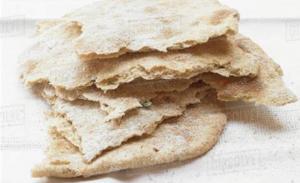The first reading this Sunday is the story of the woman who shared her last bit of bread with the prophet Elijah. In this passage, Elijah asks a woman for a drink of water and a morsel of bread. There is a famine in the land, and the woman replies that she only has enough flour and oil for one more loaf of bread. After she and her son eat that last loaf, she tells Elijah, they will die.
Elijah instructs her to share the bread and promises that the Lord will provide. And He does. For a full year after Elijah’s visit, the flour does not run out. Nor does the oil. The woman and her son are fed for a year because they were generous to the prophet in spite of their poverty.
As a child, I loved this story. It has the feel of a fable or a fairy tale about it. The moral of the story is that generosity begets generosity. Goodness is rewarded. Everyone is happy.
As an adult (and particularly as a parent) this passage feels different. How many times do parents have to tell their kids, “No, you can’t have bread alone for three meals a day. That’s not good for you.”
What’s more, we aren’t talking about a loaf of bread made with milk, eggs, and sunflower seeds. We’re talking about a recipe that involves flour, oil, and water. That’s it.
The woman and her son do not starve, but what they are given is something meager. The miracle is not that the famine ends. The miracle is not that they are granted a healthy diet rich in vitamins. The miracle is that they get what they already had: flour and oil. The miracle is simply: they get to eat.
There is a tension these days when I read scripture. My tendency is always to read as if I am looking for a metaphor. I want to say – this passage isn’t really a story about bread. It’s a story about the generosity of God. It’s a story about how we are called to be generous toward each other. It’s a story about how God takes the meager bit we have and feeds us for a year!
I like reading scripture this way. Honestly, it’s safe. It protects me from awkward questions like – could the woman and her son really survive on bread made only from flour, water, and oil? What health issues would her son have because of childhood malnutrition? What if they had celiac disease and wheat was actually harmful to them? Were their neighbors okay or did they run out of flour and die?
These questions matter. They matter because sometimes what God gives us feels meager. Sometimes our faith feels meager. Moreover, sometimes we look at our lives expecting a metaphor. We want to be able to say, “The moral of the story of my life is x.” We want to be able to understand the meaning of our lives.
The difficulty is that clearly defining the meaning of my life is not the same as living it. In attempting to live a life of faith, it’s easy to get caught up in trying to understand. It’s easy to get caught up in trying to define how God is present. It’s easy to try to make God be present by insisting on understanding our lives in a certain way.
The awkward questions about scripture matter because they are awkward questions I have about my life. They matter precisely because they aren’t metaphorical. They aren’t symbolic. They take reality seriously.
There’s nothing wrong with looking at scripture through a lens of metaphor and symbolism. There’s nothing wrong with looking for God’s presence in our lives. But I increasingly feel a pull toward a practical lens. It’s worth leaning into awkward, uncomfortable questions that demand concrete realities. Not everything is a fable. Not everything is a metaphor.
Maren Grossman is a contributor and former assistant editor at Sick Pilgrim. She received an M.A. in philosophy from Catholic University in 2007, but left grad school to homeschool her kids. Her work has appeared in the online journal Living Education, the journal Convivium, and the Ethel Zine.













